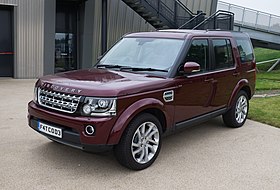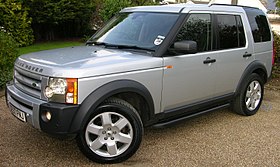Land Rover Discovery
| Land Rover Discovery | |
|---|---|
 |
|
| Overview | |
| Manufacturer | Land Rover |
| Production | 1989–present |
| Layout | Longitudinal front-engine, all-wheel drive |
| Series I | |
|---|---|

Pre-facelift Discovery Tdi three-door
|
|
| Overview | |
| Also called | Honda Crossroad (Japan) |
| Production | 1989–1998 |
| Assembly | United Kingdom: Solihull (Solihull plant) |
| Body and chassis | |
| Body style | 3-door wagon 3-door van 5-door wagon |
| Powertrain | |
| Engine | 2.0 L T-Series I4 (petrol) 2.5 L 200Tdi I4-T (diesel; 1989–94) 2.5 L 300Tdi I4-T (diesel; 1994–98) 3.5 L Rover V8 (petrol) 3.9 L Rover V8 (petrol) 4.0 L Rover V8 (petrol) |
| Transmission | 4-speed ZF 4HP22 automatic 5-speed manual |
| Dimensions | |
| Wheelbase | 2,540 mm (100.0 in) |
| Length | 4,540 mm (178.7 in) |
| Width | 1,790 mm (70.6 in) |
| Height | 1,970 mm (77.4 in) |
| Series II (L318) | |
|---|---|

1998–2002 Land Rover Discovery II Td5
|
|
| Overview | |
| Production | 1998–2005 |
| Assembly | United Kingdom: Solihull (Solihull plant) Jordan: Aqaba (Aqaba plant) Malaysia: Shah Alam (AMI, SMA) |
| Body and chassis | |
| Body style | 5-door wagon |
| Powertrain | |
| Engine | 4.0 L Rover V8 (petrol) 4.6 L Rover V8 (petrol) 2.5 L Td5 I5 (diesel) |
| Transmission | 4-speed automatic 5-speed manual |
| Dimensions | |
| Wheelbase | 2,540 mm (100.0 in) |
| Length | 4,700 mm (185.2 in) |
| Width | 1,890 mm (74.4 in) |
| Height | 1,940 mm (76.4 in) |
| Kerb weight | 2,061–2,220 kg (4,543–4,895 lb) |
| Discovery 3 (L319) | |
|---|---|

Pre-facelift Land Rover Discovery TDV6 HSE
|
|
| Overview | |
| Also called | Land Rover LR3 (North America) |
| Production | June 2004–2009 |
| Assembly | United Kingdom: Solihull (Solihull plant) Jordan: Aqaba (Aqaba plant) |
| Designer | Andy Wheel |
| Body and chassis | |
| Body style | 5-door wagon |
| Related | Range Rover Sport |
| Powertrain | |
| Engine | 4.0 L Ford Cologne V6 (petrol) 4.4 L AJ41 V8 (petrol) 2.7 L AJD V6-T (diesel) |
| Transmission | 6-speed manual 6-speed automatic |
| Dimensions | |
| Wheelbase | 2,890 mm (113.6 in) |
| Length | 4,850 mm (190.9 in) |
| Width | 1,920 mm (75.4 in) |
| Height | 2005–2006: 1,880 mm (74.1 in) 2007–2009: 1,890 mm (74.5 in) |
| Kerb weight | 2,419–2,461 kg (5,333–5,426 lb) |
| Discovery 4 (L319) | |
|---|---|

Pre-facelift Land Rover Discovery 4
|
|
| Overview | |
| Also called | Land Rover LR4 (North America) |
| Production | 2009–2016 |
| Assembly | United Kingdom: Solihull (Solihull plant) Jordan: Aqaba (Aqaba plant) |
| Designer | Gerry McGovern |
| Body and chassis | |
| Body style | 5-door wagon |
| Related | Range Rover Sport |
| Powertrain | |
| Engine | 3.0 L AJ126 V6-S (petrol) 5.0 L AJ133 V8 (petrol) 2.7 L AJD V6-T (diesel) 3.0 L AJD V6-T (diesel) |
| Transmission | 6-speed ZF manual 6-speed ZF automatic 8-speed ZF automatic |
| Dimensions | |
| Wheelbase | 288.5 cm (113.6 in) |
| Length | 483.8 cm (190.5 in) |
| Width | 202.2 cm (79.6 in) |
| Height | 184.1 cm (72.5 in) (including roof rails) |
| Discovery | |
|---|---|
 |
|
| Overview | |
| Production | 2016 (to commence) |
| Assembly | United Kingdom: Solihull (Solihull plant) Jordan: Aqaba (Aqaba plant) |
| Designer | Gerry McGovern |
| Body and chassis | |
| Body style | 5-door wagon |
| Related |
Range Rover Sport Range Rover (L405) |
| Powertrain | |
| Engine | 3.0 L AJ126 V6-S (petrol) 3.0 L AJD V6-T (diesel) 2.0 i4 diesel |
| Transmission | 8-speed ZF automatic |
| Dimensions | |
| Wheelbase | 292.3 cm (115.1 in) |
| Length | 497.0 cm (195.7 in) |
| Width | 207.3 cm (81.6 in) |
| Height | 188.8 cm (74.3 in) |
| Kerb weight | 2,193 kg (4,835 lb) (petrol) 2,230 kg (4,920 lb) (diesel) |
The Land Rover Discovery is a mid-size luxury SUV, from the British car maker Land Rover. There have been two generations of the vehicle, the first of which was introduced in 1989 and given a Series II update in 1998. The second generation, titled Discovery 3, launched in 2004 and was marketed in North America as the Land Rover LR3. These second generation models were updated in 2009 as the Discovery 4—Land Rover LR4 for North American markets. The Discovery 5 is currently in pre-production testing and was unveiled in the UK on 28 September 2016.
The Discovery Series I was introduced into the United Kingdom in October 1989. The company code-named the vehicle "Project Jay". The new model was based on the chassis and drivetrain of the more upmarket Range Rover, but with a lower price aimed at a larger market segment intended to compete with Japanese offerings. This was the only Discovery generation with a four-cylinder petrol engine.
The Discovery was initially only available as a three-door version; the five-door body style became available in 1990. Both were fitted with five seats, with the option to have two jump seats fitted in the boot. Land Rover employed an external consultancy, Conran Design Group, to design the interior. They were instructed to ignore current car interior design and position the vehicle as a 'lifestyle accessory'. Their interior incorporated a number of original features, although some ideas shown on the original interior mock-ups (constructed inside a Range Rover bodyshell at Conran's workshops) were left on the shelf, such as a custom sunglasses holder built into the centre of the steering wheel. The design was unveiled to critical acclaim, and won a British Design Award in 1989.
The original transmission was a dual-ratio five-speed manual with drive via a transfer case with a lockable centre differential.
Much of the interior was constructed from 'Sonar Blue' plastic (with blue cloth trim), with map/magazine holding slots above the windscreen, hand-holds for rear passengers incorporated into the head restraints of the front seats, remote radio controls on the instrument cluster, twin removable sunroof panels (including a special zip-up storage bag behind the rear seats) and a Land Rover-branded cloth fabric holdall in the front centre console for oddments storage that could be removed from the vehicle and worn as a handbag using a supplied shoulder strap (relatively few of these bags have survived, making them collectable items). Despite such features, the interior's basic structure was the same as the Range Rover and virtually all the switchgear and instruments came from other Rover Group cars such as the Maestro and Montego. Similarly, the Discovery utilised several Range Rover body panels, as well as headlights from the Freight Rover van and taillights from the Maestro van. The latter would continue to bear the Austin Rover 'chevron' logo on their lenses until production of the first generation Discovery ended in 1998, ten years after Austin Rover ceased to exist.
...
Wikipedia
